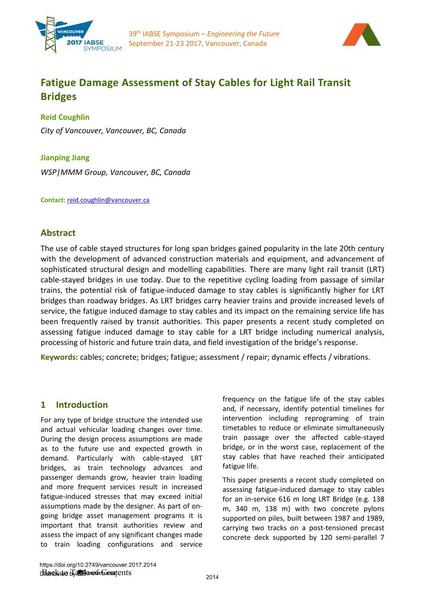Fatigue Damage Assessment of Stay Cables for Light Rail Transit Bridges

|
|
|||||||||||
Détails bibliographiques
| Auteur(s): |
Reid Coughlin
(City of Vancouver, Vancouver, BC, Canada)
Jianping Jiang (WSP|MMM Group, Vancouver, BC, Canada) |
||||
|---|---|---|---|---|---|
| Médium: | papier de conférence | ||||
| Langue(s): | anglais | ||||
| Conférence: | IABSE Symposium: Engineering the Future, Vancouver, Canada, 21-23 September 2017 | ||||
| Publié dans: | IABSE Symposium Vancouver 2017 | ||||
|
|||||
| Page(s): | 2014-2021 | ||||
| Nombre total de pages (du PDF): | 8 | ||||
| Année: | 2017 | ||||
| DOI: | 10.2749/vancouver.2017.2014 | ||||
| Abstrait: |
The use of cable stayed structures for long span bridges gained popularity in the late 20th century with the development of advanced construction materials and equipment, and advancement of sophisticated structural design and modelling capabilities. There are many light rail transit (LRT) cable-stayed bridges in use today. Due to the repetitive cycling loading from passage of similar trains, the potential risk of fatigue-induced damage to stay cables is significantly higher for LRT bridges than roadway bridges. As LRT bridges carry heavier trains and provide increased levels of service, the fatigue induced damage to stay cables and its impact on the remaining service life has been frequently raised by transit authorities. This paper presents a recent study completed on assessing fatigue induced damage to stay cable for a LRT bridge including numerical analysis, processing of historic and future train data, and field investigation of the bridge’s response. |
||||
| Mots-clé: |
béton ponts câbles
|
||||
